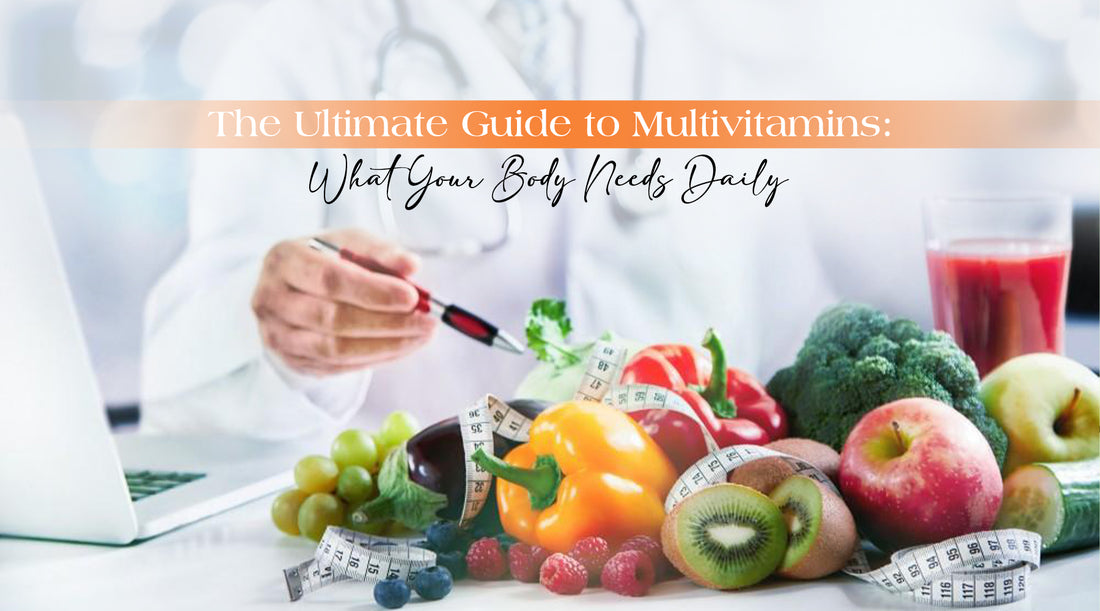In-Feed This article was published more than 10 years ago. From hectic work schedules to improper eating, it’s simple to skip on important vitamins and minerals that are important for your general well being. That’s where multivitamins play a perfect role — they are a fast and effective way of making sure that your body is taking all the vital and needed nutrients everyday.
In this guide, we will be exploring everything you need to know about multivitamins, from what vitamins and minerals your body needs to thrive, what benefits they may provide, and how to pick one that aligns with your needs.
What Are Multivitamins?
Multivitamins are dietary supplements that pill and powders that combine a variety of vitamins, minerals, and sometimes other ingredients that help bridge the nutrient gaps in your diet. Usually available in the form of tablets, capsules, gummies, or powder, supplements are taken on a daily basis to promote overall health and well-being.
Although multivitamins can assist in our overall health, keep in mind that they’re meant to be taken in addition to (not as a substitute for) a well-balanced diet of fruits, vegetables, whole grains and lean proteins. They are designed to supplement what you eat when it’s challenging to meet your nutritional needs with food alone.
Important Vitamins That Your Body Requires
There are 13 vitamins essential to human health (the body cannot produce them), so they must be obtained from food or other supplements. These vitamins are essential for many bodily functions, from supporting immunity to skin health and energy production.
Vitamin A
Get Your VitaminsVitamin A is essential for healthy vision, skin and immune function. It's also essential for cell growth and reproduction. Vitamin A is found in foods such as carrots, sweet potatoes, and spinach. What does vitamin A deficiency lead to?Night blindness, and a weak immune system.
Vitamin C
Vitamin C is an antioxidant which protects the body from oxidative stress. It also helps support the immune system, helps with the absorption of iron and assists the body in healing from wounds. Oranges, strawberries, bell peppers, and broccoli are rich in vitamin C, so consider taking a multivitamin that includes this vitamin. It is good for your immune system and skin health.
Vitamin D
Vitamin D is essential for bone health as it enables the absorption of calcium in the body. Immune boosting and improving health overall. Sunlight is the best source of vitamin D, but it can be hard to get enough sun exposure during the winter months. Vitamin D can be found in foods including fatty fish, fortified dairy products and egg yolks, but for many people, particularly those who do not get much sun, supplementation may be needed.
Vitamin E
Vitamin E is a potent antioxidant that protects cells from damage. It also aids immune function, skin health and strong blood circulation. Vitamin E is present in foods such as nuts, seeds, and vegetable oils. When combined with essential fatty acids, vitamin E deficiency can weaken immunity and cause flaky, dry skin.
Vitamin K
Vitamin K plays an important role in normalizing blood clotting and is good for the bones. It assists blood in clotting properly when you’re injured and contributes to bone density. Vitamin K can be found in leafy greens, broccoli and Brussels sprouts, as well as in most multivitamin supplements, and is an essential part of human health — especially as you grow older.
B Vitamins
B vitamins are a family of eight crucial vitamins that are important for metabolism, energy production, and brain function. These vitamins convert food into energy and aid in blood-cell production. B vitamins most commonly found in multivitamin supplements include:
- B1 (Thiamine): Helps in nerve function and energy production.
- B2 (Riboflavin): Crucial for cellular growth, energy production and skin health.
- B3 (Niacin) : For converting food into energy and for skin.
- B5 (Pantothenic Acid): This vitamin contributes to hormone production and fat metabolism.
- B6 (Pyridoxine): Promotes brain function, mood regulation, and supports the immune system.
- B7 (Biotin) : Crucial for the health of your hair, skin, and nails.
- B9 (Folate): Important for cell division and red blood cell formation
- B12 (Cobalamin): Essential for neurological function and blood formation.
The Importance of Minerals in Your Body
Minerals are inorganic elements the body requires for processes like bone health, fluid balance and nerve function. The following minerals are considered essential and are commonly found in multivitamin supplements:
Calcium
Calcium building block of strong bones and teeth. It also helps with muscle function, nerve transmission and blood clotting. Calcium can be found in milk, leafy green vegetables and fortified foods. However, many people will not consume adequate calcium from diet alone, especially with advancing age, and so calcium supplementation is often suggested.
Magnesium
Magnesium helps muscle and nerve function, bone health and energy production. It also helps control blood sugar levels and induces relaxation. Foods that are rich in magnesium include leafy greens, nuts, seeds and whole grains. Magnesium deficiency can result in muscle cramps, fatigue and sleep disruption.
Iron
Iron helps make red blood cells and carries oxygen around the body. This is particularly vital for premenopausal women, pregnant women and vegetarians or vegans. Red meat, poultry, beans and fortified cereals are good sources of iron. Low iron can lead to anemia, which causes fatigue and weakness.
Zinc
Zinc is essential for immune function, wound healing and cell growth. It helps with taste, smell and skin health. Zinc sources include meat, shellfish, legumes and seeds. Zinc deficiency may contribute to compromised immune function, impaired wound healing, and skin problems.
Iodine
Thyroid function and metabolism regulation require iodine. It assists in producing thyroid hormones, which control energy levels, body temperature and metabolism. Iodine appears in iodized salt, seafood, and dairy products. A lack of iodine can cause thyroid issues and exhaustion.
Advantages of Multivitamins
For those not receiving all the vital nutrients through their diet, taking a multivitamin every day can offer a plethora of health advantages. Here are some of the most advantageous reasons to make multivitamins part of your daily routine:
Fills Nutritional Gaps
Even with a healthy diet, it might be difficult to find the vitamins and minerals in your body toilet training. Multivitamins can help supplement those gaps, and ensure that you’re getting the right nutrition.
Boosts Immunity
Vitamin C, vitamin D, zinc and other vitamins are very important for your immune system. Taking a daily multivitamin can help your immunity stay strong and healthy —particularly for flu season.
Supports Bone Health
Calcium, vitamin D and magnesium are among the vitamins and minerals that help keep bones strong and healthy. Multivitamins may help maintain bone density and lower the risk of osteoporosis and fractures.
Improves Energy Levels
Energy-production requires B vitamins and iron — both of which are excellent sources of energy. If you’re feeling run down or sluggish, a daily multivitamin can help fight fatigue and increase overall energy levels.
Improves Skin, Hair, and Nail Health
Some vitamins (biotin, vitamin C, and vitamin E) are supportive to the skin, hair, and nails. An effective multivitamin will provide your body with these nutrients to help improve the way your skin looks, as well as to help strengthen brittle nails and thinning hair.
How to Pick the Best Multivitamin for You
When selecting a multivitamin, be mindful of your unique health needs, lifestyle habits and age. Choose a supplement that contains a balanced combination of necessary vitamins and minerals. Depending on one’s health status, condition-specific nutrients may also be needed — like iron for someone with anemia or calcium and vitamin D for postmenopausal women. You should also select a multivitamin from Vita Glow.
As our daily diets can sometimes fall short in covering the range of vitamins and minerals our bodies require, multivitamins provide a solution, delivering a convenient combination of essential nutrients necessary for your overall health. Multivitamins can supplement the gaps in your diet and have a host of health benefits — from boosting immunity to helping build strong bones, healthy skin, and increased energy — while they should complement picturing a balanced diet. Finding a multivitamin that suits your requirements can go a long way in promoting your overall health and wellness, making sure your body has everything it needs to function at its best, day in, day out.









